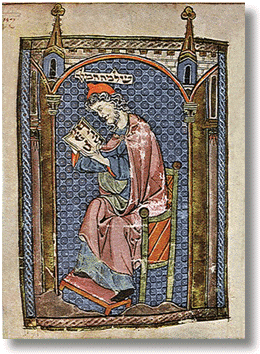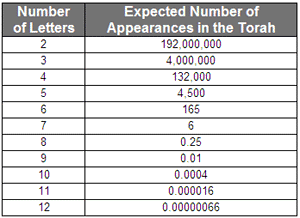| |
 Are You in the Bible Codes?
Are You in the Bible Codes?
"All that was, is, and will be unto the end of time is included in the Torah," said the Vilna Gaon, among the wisest rabbis in history. This astounding statement has been a guiding light for many code researchers, especially orthodox Jewish researchers who look for codes only in the first five books of the Old Testament, which contains 304,805 letters.
Is it possible to extend the Vilna Gaon's theory to the rest of the Hebrew books of the Bible? If you believe that all of the Old Testament, not just the Torah, was inspired by God, as many Christian researchers do, then this adds another 892,116 letters to the search range.
And then for many people interested in the codes the question becomes, "Am I in the Bible codes?" If the names of John F. Kennedy and Princess Diana are encoded in the Bible, why not mine? What follows naturally, of course, is, "What do the Bible codes say about me?" Or, "Do the codes say what is going to happen in my life?"
In other words, many of us are not satisfied with the knowledge that our names may be somewhere in the Bible's coded text. We want to know for sure that they are there, where they are located and whether there is a connection between the codes and the contexts of the texts where they are found. We want to know who else is located there�loved ones, celebrities, world leaders�with us in our cluster, if indeed there is a cluster.
A good example of such a cluster is the family one researched by Moshe Shak of Montreal. It shows in detail a history of Shak's rabbinical ancestry and some of the facts of his own life.
A Few Problems to Overcome
There are a few problems to overcome as you begin to search for your name in the Bible code. One of the major ones is the spelling of your name in Hebrew. Then, there is the number of letters in your name, and how you might be able to accurately shorten them so that you can increase your odds of a successful search. How to look for it is next.
First, though, you need to wrestle with your motives for finding your name in Bible codes. If you are simply looking for it as an amusement, or to astound and amaze your friends, fine. But if you're searching for answers about what the future holds for you, you should seriously consider what the surface text of the Bible says about trying to determine impending events in your life.
God reserves the future for Himself because He desires mankind to trust Him concerning the unknown. In the law given to Moses, the Lord was tough on false prophets who attempted to foretell coming events or to "speak presumptuously" without His guidance. They were to be put to death (Deuteronomy 18:20). Likewise, people who used false prophecy to lead people away from trust in Jehovah were to die (Deuteronomy 13:5). Mediums, or diviners of secret things, were also condemned to death by the Lord (Leviticus 20:27).
As we have discussed in past issues of BCD as well as on the web site, the longer a word is, the less likely you are to find it as a code in the Bible. If, for example, your name is similar to the new California governor's, you need to begin thinking "work-around." As terse a language as it is, Arnold Schwarzenegger's name is almost as long in Hebrew as it is in English or German. Even A. Schwarzenegger is eight characters long, making it very difficult to find.
Why is that? For the sake of simplicity, assume that all Hebrew letters appear in the Torah with the same frequency. Then the expected number of times a code will appear in the Torah drops rapidly as the number of letters in the code increases, as shown in this table:
|

This helps to show why a 73-letter code, such as the longest ever discovered, is so amazing. If a code has six letters or less, it is nearly certain that you could find it somewhere in the Torah, and probably find it in many places�even War and Peace or Moby Dick. If it has eight or more letters, it is very likely that you won't find it anywhere in the Torah by chance. The probability that you will not be able to find a word you selected as a code in the Torah is 78.5% if it has 8 letters, 99.0% if it has 9 letters, 99.96% if it has 10 letters and 99.998% if it has 11 letters.
Why does this rapid drop-off in the expected number of occurrences take place? First, the number of possible ELSs that can be found in the Torah is far less than infinite. In fact, the number of possible ELSs made of 15 or fewer letters is less than a trillion. So it is limited. Furthermore, as the number of letters increases, the number of different "words" that can be made with any given number of letters increases exponentially while the total number of possible ELSs declines slowly.
For example, we recently searched for the name of Judge Roy Moore, a 10-letter string in Hebrew, including title, given name and surname. We were surprised to see that our software found it once in the Bible with a skip of 6,805 letters between each of its letters. The odds were less than one in a million against our making this discovery, according to the probability function of our search software, Bible Codes 2025. When we tried to find The Ten Commandments, another 10-letter string, our luck was not so good. We could not find it at all.
Bob Lee Appears Many Times
So if your name is Bob Lee, your name is likely to appear almost a million times�977,837 times to be exact, according to the Bible Codes 2025 probability calculator. At this point, you might decide to use your full name Robert in the search string. That would bring the results down to 204 finds. That is still a lot of codes to sort through.
Now Bob could either add a middle initial to extend the search string to Robert E. Lee, or he could switch to the Codefinder search software and add a few other words to his search for Robert Lee and/or Robert E. Lee. He might add the Hebrew words for General, Civil War, Confederate, Mary Anne (his wife), Arlington, Traveller (his horse), Appomattox and a few others to the list. Codefinder will show all of the instances where these additional terms appear near the focal term, along with matrices of these clusters. You can then carefully examine these clusters to see if other related words appear there. Or, you can bring the findings from Codefinder over into BC2000 and ask the software to show you Hebrew words in the vicinity of the focal code.
BC2000 also has an extensive list of common first names that can help you get started. Like our example Bob Lee, you might have a last name that is also a first name, making it a snap to learn the Hebrew spelling of your full name, because you find both your given and surnames in the BC2000 list. Or, if your last name has a Hebrew spelling, such as Aaron, Joseph, Samuel and so forth, you can probably find it in BC2000's database of Bible name spellings.
However�and this is the most critical step in most searches�you will need the help of a Hebrew-speaking person to help you with Hebrew transliterations of your last name.
The process of transliteration is as much art as science. There may be five or six different spellings of your name in Hebrew, all equally valid, depending on the transliterator. As explained earlier, the one with the fewest letters is the best in terms of being easier to find, but those with the greatest number of letters are more difficult to find and therefore more significant statistically when they are found.
Of course there are dozens of other ways that you can search for your name in the Bible code. You can combine it with others' names; or look for it with your occupation or special interest, such as, for instance, Bill Smith Engineer.
If you discover your name in an interesting place in the Bible, your Hebrew expert may also be able to help you with extensions of the ELS. Viewing a matrix of your name, which can be done with most search software, take a few letters leading into it from one side and a few more letters after it and have your expert see if there may be a sensible statement that includes your name.
With BC2000 you can also look for contexts of the scriptures where the letters of your name are located. As an example, we searched for George Bush's name using the software and came up with 33 finds against an expected number of 30. The first letter of the first ELS listed in the results is in Genesis 39:5:
From the time he put him in charge of his household and of all that he owned, the Lord blessed the household of the Egyptian because of Joseph. The blessing of the Lord was on everything Potiphar had, both in the house and in the field This incredible story of Joseph is the account of a faithful slave who was brought into the home of the Egyptian pharaoh's commander of the guard and, because of his proven wisdom and integrity, was promoted to a powerful position in the official's home. We'll leave it to you to decide what this may or may not say about the president's character. And there are 32 other ELSs to evaluate, too.
If you would like to do this search yourself and study the various contextual possibilities, use this spelling for George Bush:
|

Return to first page
Copyright �2004 biblecodedigest.com
All Rights Reserved
The Bible Code Digest is a publication of the Isaac Newton Bible Code Research Society. No part of this newsletter may be reproduced or used in any form or by any means, electronic or mechanical, including photocopying, recording, or by any information storage or retrieval system, without permission in writing from the publisher. Subscribers may forward to one recipient without seeking permission from the publisher.
The Bible Code Digest is published by a group of scientists and writers dedicated to a search for the truth. Our goal is provide accurate, unbiased reporting of news about cutting edge Bible code research conducted by our own group as well as by other credible researchers. We endeavor to report on the significant findings of Jewish, Christian and secular researchers, regardless of their views regarding the potential validity of some Bible codes. We present a variety of viewpoints on Bible codes and often accompanying spiritual matters in these web pages, but we don't necessarily agree with all of them. Our view is that God created codes in the Bible because He loves us and wants to show us another facet of His omnipotence and omniscience.
Inquiries may either be addressed to Dave Swaney, Editor, or Ed Sherman, Director, at BibleCodeDigest.com, [email protected].
See you next month with much more about Bible Codes.
|
|





 |









